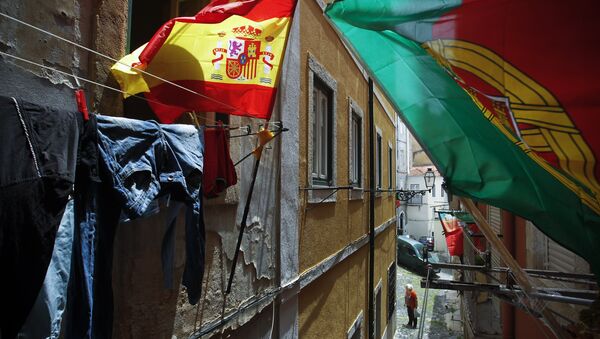He said that a final decision will be made at a session of the EU's Economic and Financial Affairs Council (ECOFIN), which is scheduled for later on Tuesday.
"During the ECOFIN session, eurozone members will unanimously vote in favor of the European Commission's recommendations, which will be followed by the automatic launch of the sanctions procedures. They should be proposed by the European Commission within 20 days," he said.
In May, Dijsselbloem said that the restrictive measures against Madrid and Lisbon were "absolutely a possibility." According to him, "when you look at the current situation in Portugal and Spain, there was a serious reason to look at sanctions."
Last week, Reuters quoted Organization for Economic Co-operation and Development chief Angel Gurria as urging the European Commission to forgo launching sanctions against Portugal and Spain.
If @EU_Commission recommends sanctions against Portugal and Council approves, the blow to Portuguese pro-European views will be immense
— João_D (@Joao_Bx) 27 июня 2016 г.
According to him, the sanctions were "the last thing we need" amid Europe's efforts to cope with Brexit and other challenges.
Earlier this month, European Commission Vice-President Valdis Dombrovskis recommended triggering Article 126(8) of the Treaty on the Functioning of the European Union to extend the deadline for the countries to "get back on a sustainable track."
#EU in technocratic implosion mode: according to Le Monde EC will recommend enforcement of 'symbolic' sanctions against #Portugal and #Spain
— rui borges (@homo_viator) 27 июня 2016 г.
The rule gives a 20-day window for the European Commission to propose a fine or a suspension of structural and investment funds.
Juan Aguilar, member of the European Parliament and former Spanish Justice Minister, said in turn that Madrid's willingness to meet the EU's requirements "will have devastating consequences" for the country, according to RIA Novosti.
In 2015, Spain's reported deficit was 5.4 percent of its gross domestic product (GDP), a sharp reduction from 2012's 10.4 percent. Portugal sharply reduced its deficit, from almost 10 percent in 2014 to 4.4 percent in 2015. However, this was not enough to meet the EU's 3 percent threshold.
Under EU rules, the EC can impose penalties of up to 0.2 percent of a country's GDP, a right it has not previously used. Doing this now, right after the Brexit referendum, will likely embolden euroscepticism among member countries, a possibility noted by Portuguese Prime Minister Antonio Costa.




